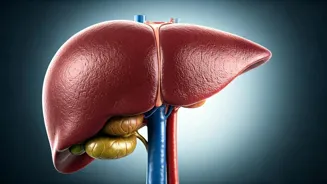Unpleasant Breath's Alarm
One of the initial indications that your liver is not functioning optimally might be a persistently unpleasant smell emanating from your mouth, commonly
known as foul breath. This is due to the liver's crucial role in removing toxins from the bloodstream. When the liver becomes overloaded or damaged, it struggles to perform this detoxification process effectively, potentially leading to a build-up of harmful substances. These substances, in turn, can be released into the breath, resulting in an offensive odor. Therefore, consistent bad breath could serve as an early warning, suggesting the need to look at your liver's health.
Skin: A Reflective Mirror
Your skin's condition can often provide insights into the health of your liver. Observe for skin problems, such as rashes, which might appear as red, itchy patches, or dullness, where the skin loses its natural glow. The liver plays an important part in processing and eliminating waste products. Impaired liver function can lead to a buildup of toxins in the bloodstream, which can then manifest as skin issues. These problems are a result of the body trying to rid itself of these toxins through the skin. By observing these signals, you can understand the current state of your liver health and seek treatment if required.
Fatigue: Feeling Drained?
Unexplained fatigue, which can be characterized by persistent tiredness and a general lack of energy, is another signal that can point towards liver distress. The liver is essential for converting food into energy and storing it for later use. If the liver's functionality is compromised due to an accumulation of fat, this process can be affected. Consequently, the body may not get enough energy to perform its functions normally. Fatigue is thus a common symptom, signaling that your liver might be working harder than it should. Take note of the level of tiredness you regularly experience to understand your health.
Brain Fog's Clarity Challenge
When your liver isn't operating correctly, you might experience what is commonly called brain fog, characterized by mental cloudiness, confusion, and difficulty concentrating. The liver's role in detoxification is essential; it removes harmful substances from the blood to protect the brain. If the liver's function is compromised, these toxins can accumulate, affecting brain function. This could then result in difficulties with memory, focus, and clear thinking. When you experience brain fog, this could be a sign that the liver is struggling. Assessing the state of your liver is important to help in regaining cognitive clarity.
Sugar Cravings Explained
Unexplained sugar cravings may hint at underlying liver issues. The liver plays a key role in regulating blood sugar levels. When the liver is struggling to work effectively, it might lead to erratic blood sugar fluctuations. These fluctuations can lead to increased sugar cravings, as the body attempts to balance its energy levels. Moreover, a fatty liver can cause insulin resistance, exacerbating this problem. Therefore, if you find yourself frequently craving sugary foods without any clear reason, it could be a sign your liver needs attention and that you should focus on improving your liver health.






















